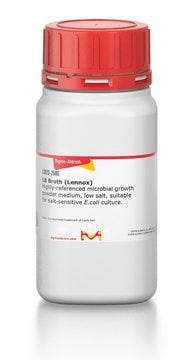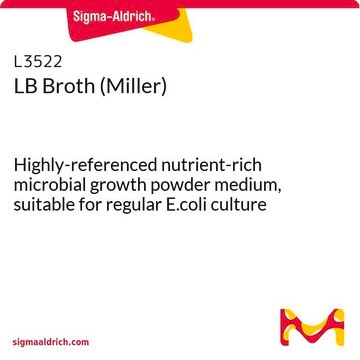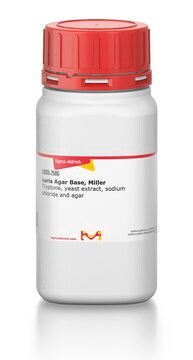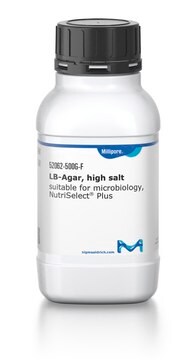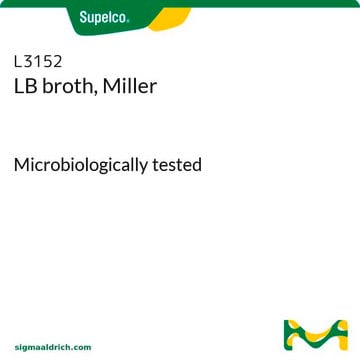L2897
LB Broth with agar (Lennox)
Highly-referenced microbial growth powder medium with Agar, low salt, suitable for salt-sensitive E. coli culture.
Synonym(s):
Lennox broth, Luria Bertani Agar
About This Item
Recommended Products
grade
for molecular biology
Quality Level
sterility
non-sterile
form
powder
composition
Agar, 15 g/L
NaCl, 5 g/L
Tryptone, 10 g/L
Yeast Extract, 5 g/L
technique(s)
microbiological culture: suitable
application(s)
food and beverages
microbiology
storage temp.
room temp
suitability
nonselective for Escherichia coli
nonselective for coliforms
Looking for similar products? Visit Product Comparison Guide
General description
Application
- the transformation of competent E. coli cells
- to cultivate Ecc-15 bacteria
- embedding scaffold containing tissue derived from induced pluripotent stem cells (iPSCs)
- transmission electron microscopy (TEM) and immunohistochemistry (IHC)
Features and Benefits
- A budget-friendly alternative to pre-poured plates
- Easy scale-up using larger package sizes
- Standard formulation
Preparation Note
2. Heat to boiling while stirring to dissolve all ingredients completely.
3. Autoclave for 15 minutes at 121°C.
To prepare Lennox L Agar: Add 1 g glucose and proceed with preparation instructions as above.To prepare the medium of Enquist and Sternberg: Aseptically add 10 ml sterile 1 M magnesium sulfate after autoclaving.
Legal Information
related product
Storage Class Code
11 - Combustible Solids
WGK
WGK 3
Flash Point(F)
Not applicable
Flash Point(C)
Not applicable
Personal Protective Equipment
Certificates of Analysis (COA)
Search for Certificates of Analysis (COA) by entering the products Lot/Batch Number. Lot and Batch Numbers can be found on a product’s label following the words ‘Lot’ or ‘Batch’.
Already Own This Product?
Find documentation for the products that you have recently purchased in the Document Library.
Customers Also Viewed
Protocols
Preparation of Plasmid DNA by Alkaline Lysis with SDS: Maxipreparation between Cold Spring Harbor Laboratory Press and our research team.
General protocols for growth of competent cells in microbial medium.
Our team of scientists has experience in all areas of research including Life Science, Material Science, Chemical Synthesis, Chromatography, Analytical and many others.
Contact Technical Service